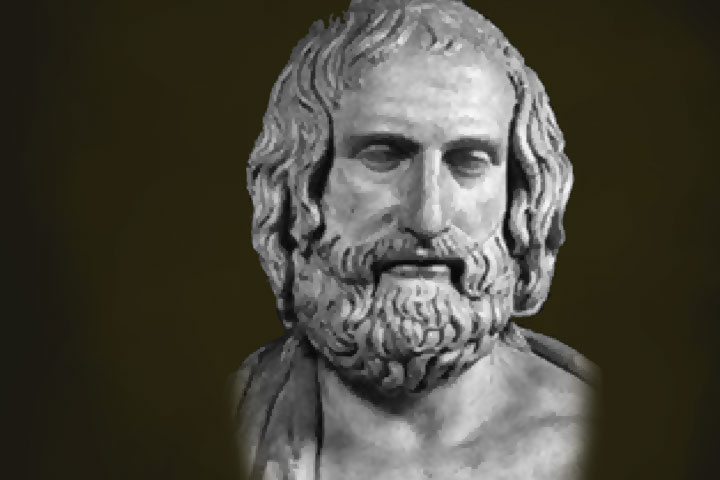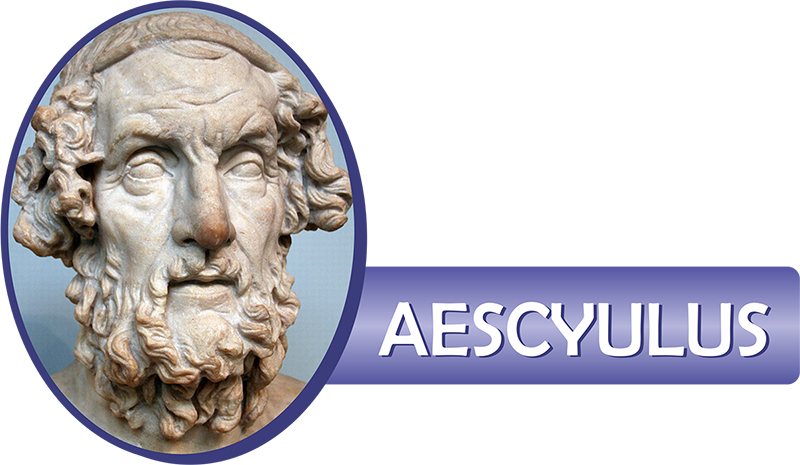
The stage is set in Antiquity. It was the beginning of the 5th century BC. The city of Athens had just entered the most glorious era of its history. The despotic and tyrannical rule of the Peisistratus had been overthrown. A few years past, crucial political reforms were instilled which manifested Athens into a complete democracy, Europe’s first. What later took place was the Persian invasion which, by some great act of the Gods, was defeated by the conduit of several small Greek nations uniting under the Athenian rule. Athens then organized the ‘Delian’ league and slowly began to transform into a worthy empire. Athens became wealthy and powerful, the center for all the cultural and intellectual activity in Greece. The century following these events witnessed a rise of geniuses through various sectors of human activity, a feat which has rarely been witnessed thousands of years since.
Witnessing, and to a certain extent marshalling, this live transformation of Athens was Aeschylus, who like every other Athenian, shared the pride and the glory of his dear city. One can even go as far as to say that Aeschylus was one of the founding fathers of the au courant Athens. He was one of the renowned “Men of Marathon,” the fearless band of warriors who resisted the first wave of the Persian suppression. He was also known for his tragic plays, which then, revolutionized theatre. Considered by many as the ‘inventor of tragedy’, his plays were always known to manifest a tragic sense of loss or grief in the viewers. It is said that a man, never becomes one unless he has valiantly faced and conquered the tragedies that torment his very soul. Aeschylus was a man of such stature, who not only faced many a barrage of tragic incidents but lived through it to tell tales of loss and misery so well wrought that the world would lament on the anguish of his characters.
Come let us witness the rise of the MASTER of tragedy. Living, watching and experiencing it through the very pen of this valiant, creative and artistic soul, whose plays are fabled to even induce labour pain in pregnant women. Let us watch the very play of Aeschylus live, as it unfolds before our very eyes.

525 BC. Eleusis, a small town situated west of the city of Athens, was the famous home of the ‘Cult of Demeter’, a mysterious cult which was known, through various rituals, to prepare Greek souls for their transition into afterlife. The people of Eleusis guarded the secrets of their cult and their city dearly. One such man was Europhion. Europhion was a member of a prominent aristocrat family who were well known for their composition of tragic poetry. But Europhion would forget to compose tragedy this year for he was bursting with joy. Aeschylus, his son was born.
Coming from a wealthy and poetic family, Aeschylus’s education did not only comprise of the normal ‘abcd’ that one learns. His education also included writings of Homer, who is best known for writing the “Iliad” and “Odyssey.” Homers writings later, would prove to be one of the main inspirations for Aeschylus to wield a pen.

As a child, Aeschylus was immersed in the mystical rites of the city and the worship of the Mother and Earth Goddess, Demeter. One day, Aeschylus was sent to the countryside to watch the grapes ripening as they needed to be picked in perfect conditions to make wine.
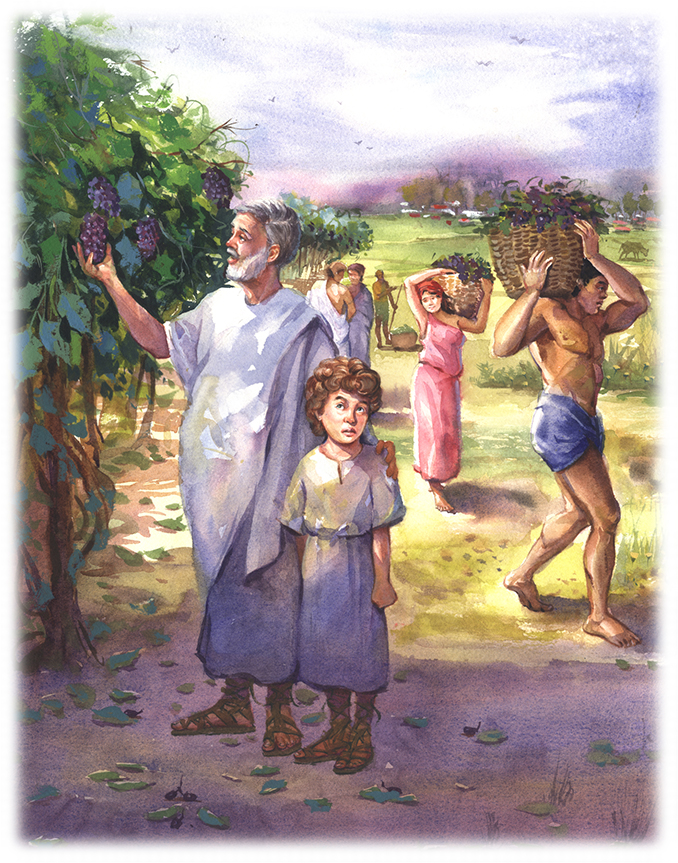
Young Aeschylus was soon bored by the task at hand and fell asleep. According to Aeschylus, when he was asleep, the Greek god of grape harvest, Dionysus visited him in his dream and ordered him to write tragedies.
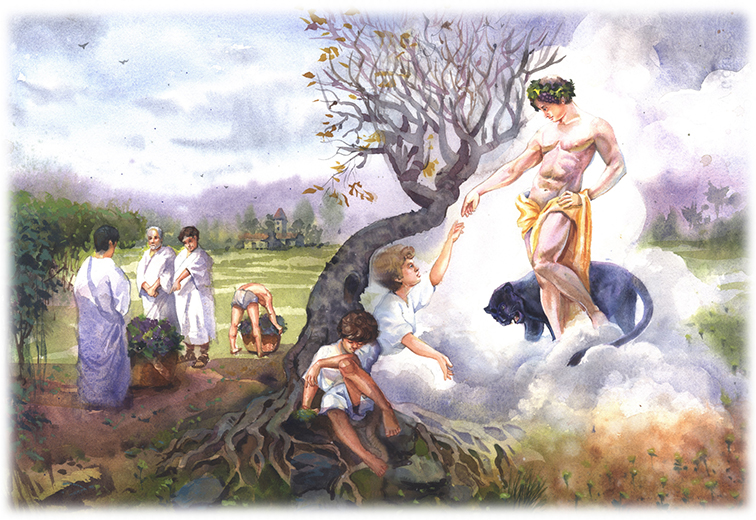
Not one to disobey a Godly order, Aeschylus set to the task of writing a tragedy the very next day. He succeeded ‘easily’.

When young Aeschylus first started writing, theatre had just begun to evolve. Plays then, were a bit more of animated paeans or a choral poetry complimented with expressive dance. They were written for only one actor and a chorus. Usually a chorus would dance and exchange dialogues with a single actor who portrayed one or more characters with the assistance of masks.
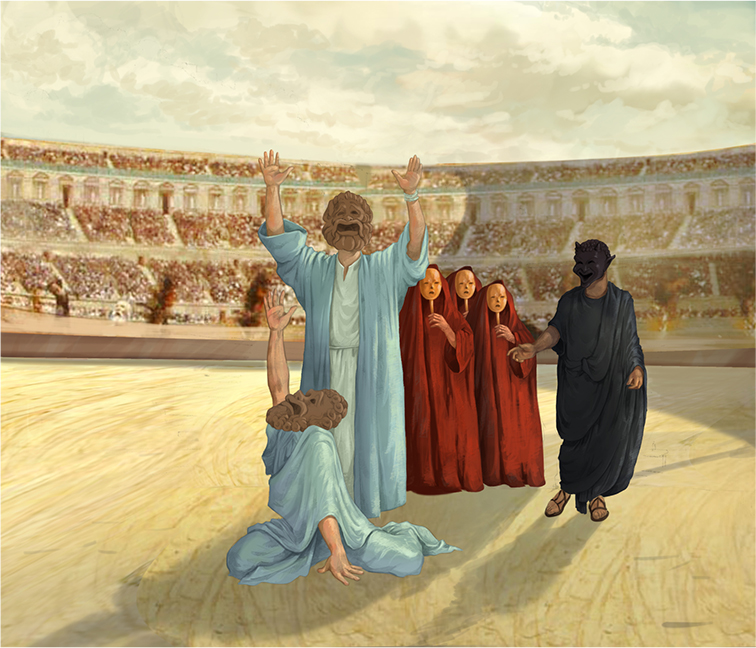
Thus, it was a huge leap for drama when Aeschylus added parts for a second and third actor. He even attempted to use the chorus directly in the action of the play. He also complimented his acts with rich costumes and dance. Most of the action happened in a circular dancing area or “orchestra” which still remains from antiquity when dance had been nothing but a circular dance around a sacred object.

Aeschylus wasn’t just a playwright, he was a patriot too. When the peace and tranquility of his motherland was threatened by the Persians, Aeschylus and his brother enrolled in the Greek army. Their battalion was stationed at Marathon. The Persian horde was marching down to marathon in large numbers. These brave men fought the Persian invasion fearlessly and relentlessly even though they were outnumbered by thousands. Aeschylus lost his dear brother to the cause but the Persians were conquered and the invaders were vanquished. The warriors who fought this war would be known through history as the “Men of Marathon.”

The festival of Dionysus, the legendary dramatic competition was held every year in spring. This festival drew the most talented playwrights from and around Greece. The plays were composed in trilogies. Three tragedies were written and showcased in a non-sequential arrangement or on one common theme along with one satyr play or a caricatural comedy. The plays then were judged according to a high aesthetics criteria and the general approval of the audience.
Aeschylus was renowned for the brilliance of his poetic diction which outweighed all contemporaries and provided him with an edge over the other playwrights. In his gifted hands, old myths would become powerful impressions of crucial, moral and theological problems. Aeschylus diligently took part in the festival but it was not until 484 BC that Aeschylus could taste victory and taste it for the twelve consecutive years after that.

Aeschylus’s earliest existing work is the play “The Persians” which was presented in the year 472 BC. Although being the undisputed champion of the competition for most of his career, Aeschylus lost once to the young Sophocles who had just begun his career as a playwright. But Sophocles did not get to taste success the next year for Aeschylus came back with the “Oedipus” trilogy of which only the “Seven Against Thebis” remains.
Near the end of his life Aeschylus created his masterpiece the “Oresteria” trilogy. “The Oresteria” is the only intact trilogy of Aeschylus which is considered even today to have significant tragedic influence, though being written in antiquity.
Shortly after, Aeschylus travelled to the ancient city of Sicily and suddenly died in Gela under mysterious circumstances. Many believe that a bird mistook his bald head for a rock and dropped a turtle on it in order to break it. But unfortunately it killed Aeschylus on the spot.
His legacy was continued by his son Euphorian who was a prominent dramatist in his own right. Aeschylus’s innovations in the ancient dramatic form were fundamental. He expanded the presentation of drama by introducing a second and a third actor, more elaborate costumes, stage machinery and backdrops. Nobility, solidity and the high echelon of language and theme are the grand characteristics of the father of tragedy.
Aeschylus was the creator of over 90 tragedies out of which only a handful have been salvaged. The rest have been lost in the sands of time never to be found again. What remains of them is only a notion of their existence. Of what remains, is his fully intact masterpiece, “The Orestaria” which is still considered as one of the greatest tragedies ever written.
Aeschylus died as he lived, through tragedy. None then, and none now could tantamount to the great playwrights writing prowess. They say that when his play, the Euminides was performed for the first time, the chorus of the furies were so frightening In appearance that they caused young children to faint, patriarchs to urinate and pregnant woman to go into labor. Such was the gift of God.
Such was his gift of inducing tragedy. Such was the greatness of Aeschylus, the “Father of Tragedy”
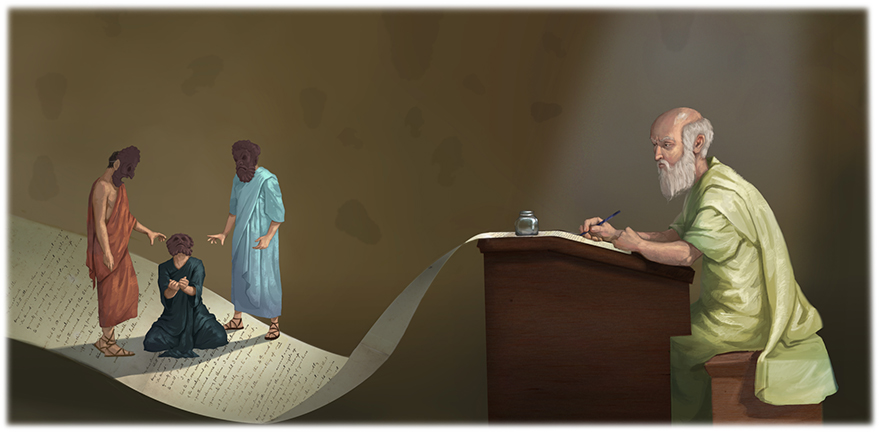
Next Biography










